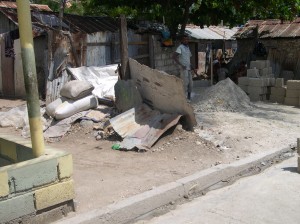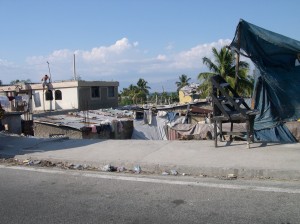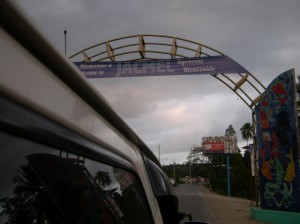Day 1— March 29
Today is the day we are supposed to arrive in Haiti by 1 in the afternoon. That is not going to happen. I am writing this entry sitting aboard an American Airlines jet in Miami that has been delayed for the 2nd time with electrical problems. The air and light system keep failing. This is not a good omen for staying UP in the sky… I don’t know enough about the electrical systems within an airliner, but I assume they are extremely complicated and interconnected….
Leaving Philadelphia— our flight was delayed three hours, so I arrived in Miami after midnight.
The pilot assures us that we will arrive in Port au Prince— sometime this afternoon. When there are delays in travel like this, the whole sequence of arrangements with people and transportation in Haiti gets scrambled. Flexibility is the key and self-reliance and clear communication as possible helps to unscramble the potential mess. All I can think about is to keep calm and keep a clear head for analyzing the situation and acting with deliberateness and determination but calm.
Jacmel is 3 hours by bus from Port au Prince. We have transportation arranged, but the longer we sit in Miami, the longer the connection in (Port au Prince) PAP will have to wait. I can only hope that they will be there when I finally arrive.
One of things I have learned to do is to be prepared with multiple things to do while waiting for the flights and being on the plane; assorted reading material, academic and non-academic, writing materials on computer and paper for taking down notes or other scribbles. If I get bored with one, I move onto another. It doesn’t always work, but I am not one to play video games or watch movies, although I have done that too. I forget to think about doing that when I am traveling; it’s not second nature to consider those things.
On board the plane are two distinct groups traveling to Haiti ; one is working for Habitat for Humanity and the other is a medical team. I don’t know where they are going. I know one thing: this plane is full of people—7 seats across and over 40 rows deep. It’s a 767 aircraft. I don’t know too much about planes and the types, but holds a large number of people.
One of the other amusing realities is that instead of Spanish, which I am used to hearing, people are speaking French. It only goes to remind me that I am entering an unfamiliar world. While you might think this an obvious and therefore superficial statement to make for an ethnographic researcher, it makes me aware that I am entering another culture, a naive and uninitiated person in the culture. Wrapping around the observer role and begin to record the elements of this world need to enter with an uncluttered mind and an eagerness to embrace whatever challenges are there. Ask the right questions and respect the culture as I attempt to record with verisimilitude the aspects of this new ethnographic adventure in Haiti.
Then, we drove through Port au Prince on the way to Jacmel. I am going to try to describe for you some of what I saw and let it speak for itself, if that’s even possible. I don’t want to write anything here that does not reflect a respect for the culture and people of Haiti.
Port au Prince looks like a war zone after the bombers have finished off what the troops weren’t able to destroy. The earthquake leveled so many structures, but I can’t tell what is the work of the earthquake and what is the work of negligence.
Down every street almost men and women are sitting on the sidewalk with merchandise laid out in front of them: shoes, clothes, sugar cane, old tires, pieces of hardware removed from doors and windows. Stacks of wood planks, or rested wrought iron gates, hinges and other metal architectural pieces.
Along the busier boulevards with more closed store front space, some people are selling pieces of mechanical equipment: tie rods, hub caps, large used wash buckets, any metal equipment/tool that still has any use regardless of the rust.
From this main street boulevards, small side streets snake to some unseen ending. Even these areas a filled with sellers, children playing soccer or just kicking a ball around, women balancing baskets and other large bags upon their heads. All of this commercial activity takes place in front or underneath some covering. The covering is propped up by dry branch sticks from a long dead tree. That covering may be a piece of tin, a once blue colored cloth, now almost threadbare .
Behind these makeshift selling stalls, people have reclaimed of a destroyed structure, and make it inhabitable with more of the same blue cloth, ruffled tin segments. All around piles of untouched rubble recall the depth of the destruction to any one or all of these structures.. Then, in front of some of these buildings, a woman or man will be sweeping the trash and rubble off the sidewalk and down the gutter to another place that is not in front of their dwelling. These makeshift structures have the same grey, cinder block color, what’s left of them anyway. Along the street, these structures are grouped together depending upon what the earthquake destroyed.
Mile after mile after mile—— then there’s the trash. One has to assume that Port au Prince has no systematic trash collection system, except maybe for the wealthy. Instead, trash is thrown into waterways, the street, behind the tin gates guarding a large open area that was once a house or business. Open city drains large and small which weave through the neighborhoods are piled with trash. The dogs, cats, pigs and other city animals forage for food among the piles of trash. Even some people.
Amid this scene, a noisy horn blares out its message. That signals to the driver any vehicle near it to move out of the way. This transportation vehicle is called a “tap tap.” These tap taps have no single design. It could be a bus, old truck or van with wooden seats and a cover rigged in the back instead of a tools chest.
These are painted with designs and the brightest colors—they cover the entire vehicle. It made me smile and chuckle.
The way to Jacmel leads over the mountains on some long and winding roads. I thought when I arrived there, it would be somehow better than in Port au Prince. It isn’t.
Some of the streets are paved, but most are stone and dirt thoroughfares with large pot holes— not quite as big as those in Philadelphia or on the PA turnpike. Trash is everywhere. People walk up and down winding streets, dogs and children running around while the motorcycles honk and beep to those walking or turning a warning that someone is coming. Even here, people have homes with the bare necessities. A roof over there heads, a place to sleep and cook dinner. Many of the women/ girls have to walk to find clean water since there may not be any running water in the home. Some men and women were physically washing their bodies and their clothes in the “fresh” water streams running into the Caribbean.
You might get the idea that there is nothing positive to write about since I have spent so much time describing such primitive and squalid conditions. For an American who has a home, makes a livable wage, and can afford to buy what she needs, the lack here of even the basic necessities like hot and cold running water, clean water, a trash system, access to reliable health care systems, even food and clothing slapped me with a harsh reality I was not ready for.
While I was focused on my reaction, I could have missed the real richness that exists in Haiti– its people. That may sound trite, but I mean it. They do not have many personal possessions, but the people I have met are clothed, they smile, they are not all malnourished skeletons, but they are welcoming and willing to share. I have not heard a “woe is me” or even seen the hint of complaint about their living conditions and personal suffering. They don’t want our pity; they want help to make a better life for themselves and their children. They need the resources—human or material—to help them until they can do it alone.
I am hesitant to say these things because I was on a bus driving through Port au Prince, and I am relaying what I saw on one day—a first impression. I am sure there are people who are much more desperate than I describe hidden in the doorways and passages.
People here live with less, much less in terms of comforts, quality and amount of things, but they don’t have any less of a meaningful life, value or purpose. I realized that those who have so little to give are so willing to share what they have and appreciate the small acts of assistance as the most enormous gift. I have never felt so humbled.
My purpose for being here, if I ever doubted it, has taken on life of its own.



